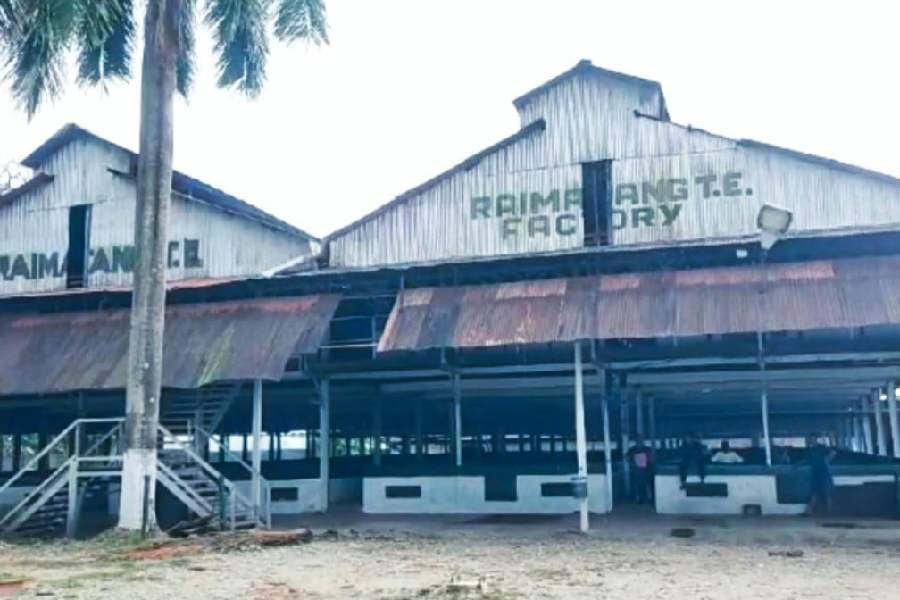The closure and abandonment of six tea estates in the Dooars in the past four days over differences of opinion on bonuses have not only left around 7,000 workers jobless ahead of Durga Puja, but also brought into focus the financial distress that plagues north Bengal's brew belt.
In the tea industry, the bonus is paid ahead of Durga Puja every year.
Representatives of tea planters’ associations have said that the steady rise in the cost of production and the virtual stagnancy in tea prices over the last few years have led to a grim situation where paying workers the annual bonus at the rate of 20 per cent of their annual salary is "simply unviable".
Senior trade union leaders, however, are not ready to buy the argument of the planters. They have alleged that a section of tea companies were trying this year to pay workers bonuses at a much lower rate than in preceding years by pleading financial incapacity to jack up their profit margins.
Since last Thursday, six gardens — four in Jalpaiguri district and two in Alipurduar district — closed down or were abandoned by their respective management because of differences with the workers over the rate of bonus.
According to the Indian Tea Association (ITA), the largest association of tea planters in the country, the tea industry has been going through a period of acute financial crisis over the last few years as the tea prices have not been able to keep pace with the rising cost of production.
“Over the past decade, tea prices have grown at a CAGR (compound annual growth rate) of around 4 per cent. On the other hand, the costs of vital inputs that go into tea production such as coal, gas, fertilisers and chemicals have increased at a CAGR of anywhere between 9 and 15 per cent during the same period. Also, amid semi-stagnant prices, the daily wage rate of workers has increased significantly in the past five years,” said a source in the ITA.
“This depressed price situation has made it difficult for many tea companies to fulfill their financial commitments on the eve of the festive season,” the source added.
In Bengal, a tea worker gets Rs 250 per day currently. The last revision was done in June this year by the state government — an increase of Rs 18 a day — through a notification as the minimum wage rate for tea workers has not been fixed in the state so far.
A senior planter based in Siliguri said that in 2023, the prices of various teas in auctions had declined alarmingly compared to the prices of 2022.
“One of the principal reasons for this reduction was the introduction of the Bharat system of auction (in April this year). The tea board has recently decided to revive the old English system, but the new system has already done the damage since April as gardens have already sold their teas at lower prices,” he said.
According to the data available with the ITA, in some of the past auction sales, the average price of a kilo of tea declined by as much as Rs 46 compared to last year at the tea auction centre in Calcutta.
“The auction prices of Darjeeling tea were below the cost of production. Also, prices of CTC and dust teas in some of the sales in this year was around Rs 13 less in Assam and around Rs 11 less (per kilo) in Bengal compared to last year’s prices,” said a planter.
Another aspect that is overlooked is the increase in production because of the emergence of the small tea sector, planters said.
“Surplus teas have remained in the system as domestic consumption or exports didn’t match production,” said a representative of the ITA.
"On the export front, we are having problems as well," he added. According to him, the export to major buyers like Iran (which constitutes around 20 per cent of the export market of Indian teas), reduced by around 61 per cent since 2019 because of payment issues.
Trade union leaders, however, are not ready to buy the argument of planters. Alok Chakraborty, the chairman of Darjeeling (plains) district Trinamul and a veteran trade union leader, pointed out that the bonus that was to be paid now is the bonus of the last financial year (2022-23).
“The auction prices might have come down this year, but in 2022, the prices were higher and tea companies made steady earnings. They can’t simply deprive the workers by flagging financial issues time and again. The unions agreed to bonuses at lower rates in many gardens that are sick units. Even so, tea companies have left some gardens, leaving workers jobless ahead of festivities,” he said.
Hill meeting today
In Darjeeling hills, the rate of bonus is yet to be fixed. A meeting has been convened by the state labour department on the issue on Monday.











